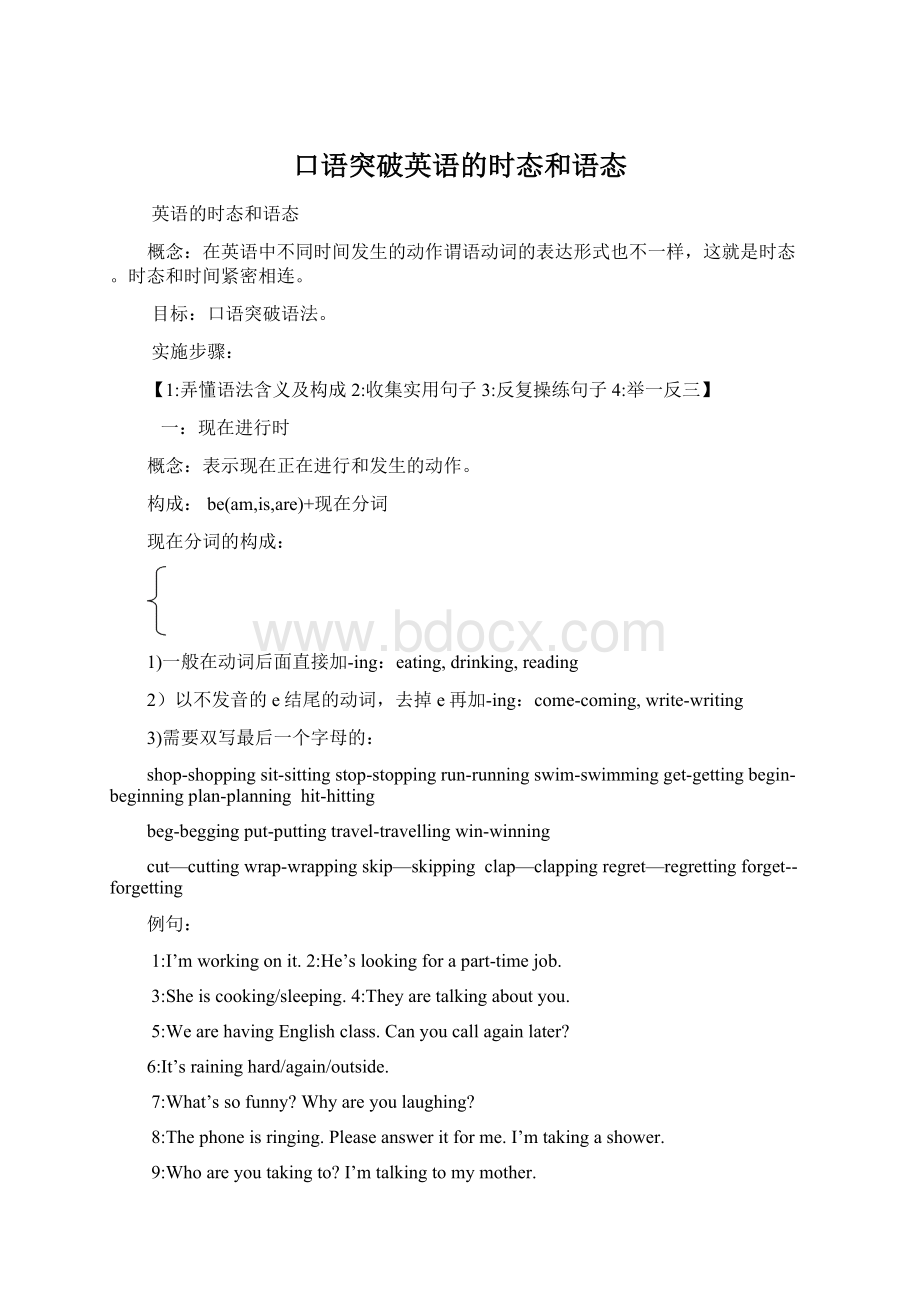口语突破英语的时态和语态.docx
《口语突破英语的时态和语态.docx》由会员分享,可在线阅读,更多相关《口语突破英语的时态和语态.docx(13页珍藏版)》请在冰豆网上搜索。

口语突破英语的时态和语态
英语的时态和语态
概念:
在英语中不同时间发生的动作谓语动词的表达形式也不一样,这就是时态。
时态和时间紧密相连。
目标:
口语突破语法。
实施步骤:
【1:
弄懂语法含义及构成2:
收集实用句子3:
反复操练句子4:
举一反三】
一:
现在进行时
概念:
表示现在正在进行和发生的动作。
构成:
be(am,is,are)+现在分词
现在分词的构成:
1)一般在动词后面直接加-ing:
eating,drinking,reading
2)以不发音的e结尾的动词,去掉e再加-ing:
come-coming,write-writing
3)需要双写最后一个字母的:
shop-shoppingsit-sittingstop-stoppingrun-runningswim-swimmingget-gettingbegin-beginningplan-planninghit-hitting
beg-beggingput-puttingtravel-travellingwin-winning
cut—cuttingwrap-wrappingskip—skippingclap—clappingregret—regrettingforget--forgetting
例句:
1:
I’mworkingonit.2:
He’slookingforapart-timejob.
3:
Sheiscooking/sleeping.4:
Theyaretalkingaboutyou.
5:
WearehavingEnglishclass.Canyoucallagainlater?
6:
It’sraininghard/again/outside.
7:
What’ssofunny?
Whyareyoulaughing?
8:
Thephoneisringing.Pleaseansweritforme.I’mtakingashower.
9:
Whoareyoutakingto?
I’mtalkingtomymother.
10:
You’remakinggreatprogressinEnglish.你的英语有了很大的进步。
(练习:
用lookfor,waitfor,talkabout练习造句)
特殊语法一:
现在进行时表示将来:
1:
I’mleaving/coming.2:
Myparentsarecomingtoseeme.
3:
HeisleavingforHktomorrow.4:
Whatareyoudoinglater?
5:
I’mnotworkingnextweek.6:
We’rehavingapartynextweekend.
7:
I’mnotgoingouttonight.I’mstayingathome.
8:
Whatareyoudoinglater?
特殊用法二:
与always,constantly等连用,含有说话人的主观色彩:
1:
Youarealwayscomplaining.
2:
Sheisalwayschanginghermind.
3:
Iamalwaysforgettingpeople’snames.
4:
You’realwayswatchingTV,You’realwaysplayingcomputergames.
请随时随地脱口而出下列句子:
1:
Whatareyoudoing?
5:
I’mreading./working.
2:
What’shedoing?
6:
Mymotheriscooking/sleeping.
3:
Whataretheydoing?
7:
I’mnotgoing.
4:
Whereareyougoing?
9:
Sheisgettingfatterandfatter.
10:
It’sgettinghotterandhotter.
11:
Everday,ineveryway,I’mgettingbetterandbetter.
二:
过去进行时
概念:
表示过去某个时刻或某个阶段正在进行的动作。
构成:
was/were+现在分词
1:
Whatwereyoudoingatthistimelastnight?
2:
ItwasraininghardwhenIwenttoschoolthismorning.
3:
TheyweretalkingaboutmewhenIcamein.
4:
Iwastakingashowerwhenyoucalled.
5:
TheywerewatchingTVwhenthelightswentout.
6:
Iwashavingdinnerwithmyfriendat8o’clockyesterday.
7:
Shewassleepingatthistimelastnight.
8:
MymotherwaswaitingformewhenIgothome.
9:
IwasshoppingatthemarketwhenImetmyEnglishteacher.
10:
Whatdidtheteachersayjustnow?
Sorry,Iwasn’tlistening.
11:
Icalledyouyesterdaymorningbutyouweren’tathome,wherewereyou?
三:
一般现在时
一般现在时主要用来表示经常性或反复性发生的动作,陈述事实及现在的状态
构成:
动词用原形,但主语是第三人称单数时动词要加-s
【主语是he,she,it,Tom,Tom’sfather等时】
动词第三人称单数的变化;
1)
一般在动词后加-s:
sing—sings,like—likes
2)以辅音字母加-y结尾的动词,变-y为i再加-es:
study-studiesworry—worriescarry---carries
3)以o,s,x,sh,ch结尾的动词,要加-es:
do—doesgo—goeswash—washeswatch—watches
一:
表示主语所具备的性格、特征、状态及喜好:
1:
I’manofficeworker.2:
Hermotherisanurse.
3:
Heistallandthin.4:
Weareofficerworkers.
5:
SheisfromAmerica.6:
Theyaremyneighbours.
7:
Igotoworkonfooteveryday.8:
Heworkshard.
9:
Shelivesnearhere.10:
Theyworkovertimeeveryday.
11:
Thegirllookslikehermother.12:
Theboyhatesgoingtoschool.
二:
表示经常性和习惯性的动作:
(常与频度副词always,usually,often,sometimes,seldom,never等连用)
1:
Mymothergetsupearlyeveryday.
2:
Heoftenstaysuplate.
3:
Sheusuallygoestoworkbybike.
4:
Mysonoftendoesherhomeworkatthelastminute.
5:
Theysometimestravelduringsummerholiday.
6:
IpracticeEnglisheverymorning.
三:
表示早已列入时刻表的事件
1:
SchoolstartsonSept.1st.2:
Thebusrunsevery10minutes
3:
Thetrainleavesat8tomorrowmorning.4:
What’stomorrow’sdate?
5:
Whatdayisittomorrow?
6:
Whenisyourbirthday?
四:
表示客观真理:
1:
Timeisprecious.2:
Healthisbetterthanwealth.
3:
Practicemakesperfect.
4:
Mothersalwaysworryabouttheirchildren.
【请脱口而出下面的句子】
Everyonewantstosucceed.
Everybodymakessuchmistakessometimes.
Thathappens.
Thedishtastesdelicious.
Theshopopensat9o’clockandclosesat6o’clock.
Areyoufreenow?
【举例说明一般现在时否定句和疑问句的变化】:
1)I’mateacher.
I’mnotateacher?
-->Areyouateacher?
-->Yes,Iam/No,I’mnot.
2)Sheisanurse.
Sheisn’tanurse.-Issheanurse?
-->Yes,sheis./No,sheisn’t.
3)Theyarestudents.
Theyaren’tstudents.-->Aretheystudents?
-->Yes,theyare./No,theyaren’t.
4)Iliketravelling.
-Idon’tliketravelling.-Doyouliketravelling?
-Yes,Ido./No,Idon/t.
5)Heworkshard.
-->Hedoesn’tworkhard.-Doesheworkhard?
-->Yes,hedoes./No,hedoesn’t.
【一般疑问句】
一:
Doyou….?
DoyoulikeChinesefood?
Doyouhaveanyhobbies?
Doyouseehimoften?
Doyougetupearly?
Doyoudrink?
Doyouoftengoshopping?
二:
Does……?
Doesheloveyou?
Doesshelivenearhere?
DoesTomspeakEnglish?
Doesyourmothercallyouoften?
Doesyoursonstudyhard?
Doesyourwifework?
DoesheteachEnglish?
DoesshehaveaBF?
【特殊疑问句】
1)Whatdoyouusuallydoonweekends?
2)Whatdoesthissignmean?
3)Whatdoestoday’snewssay?
4)WhatdoyoulikebestaboutChina?
5)Wheredoyoulive/work?
6)Wheredoyoucomefrom?
7)Howdoyougotoworkeveryday?
8)Howdoyoulikeit?
9)Whendoyougotowork/getoffwork?
10)Whendoesthemeetingstart?
11)Whydoyoulikesuchaperson?
12)Whydoyouhavetotellherthetruth?
13)WhydoyouthinkSZisabadplacetolive?
14)WhydoyoucometoChina?
15)Whydon’twehavefun?
16)Whydon’tyoulikeher?
17)Whichdoyouprefer,teaorcoffee?
18)WhichplacedoyoulikebestinChina?
19)Howoldisyourdaughter?
20)Howmanypeoplearethereinyourfamily?
21)Howmuchmoneydoyouneed?
22)Howmuchisit?
Howmucharethey?
23)HowlonghaveyoubeeninChina?
24)Howfarisitfromheretoyourcompany?
25)Howoftendoyoucallyourfamily?
26)Howsoonwillyoucomeback?
【额外奉送】一般现在时对于描述自己的情况很有用;
(一)Self-introduction自我介绍
Helloeveryday.MynameisLily.I’mfromChina.IliveinBeijing.IloveEnglish.IreadEnglisheveryday.IyellEnglisheveryday.My
favouritesportaretennisandswimming.Myfatherisadoctorandmymotherisateacher.WeareallinterestedinEnglish.DoyoulikeEeglish?
Ihopewecanbefriends.
(二)Self-introduction
Ihave2children.Mysonis8,hestudiesinaprimaryschool.My
daughteris15,shestudiesinamiddleschool.I’matecher,Iworkina
university.Mywifeworksinahospital.Wehaveahappyfamily.
(三)Alice
Aliceisaveryoutgoinggirl,shelikesmusic,shepalysbasketball,shespendsalotofmoneyonclothes.shegoestomovies,andsheoftengoestonightclub,sheknowsmanypeople,sheisverypopular.
Alicedoesn’tstayhomealoneveryoften,shedoesn’treadbooks,shedoesn’twatchTV,shedoesn’tlistentomusic.Sheisveryactive,Shelikestalkonthephone,everyonelikesAlice.
(四)MysisterandI
MysisterandIareverydifferent.I’manofficeworker,she’sasecretaryinasmallcompany.IliveinGZ,shelivesinSZ,IhaveaBF,shelivesalone.I’mrich,sheispoor.Myfatherlikesme,mymotherlikesmysister.Aloughwearedifferent,welikeeachother.
四:
一般过去时
一:
含义:
表示过去发生的动作或存在的状态。
一般有明显的表示过去时间的状语。
如:
yesterday,lastnight,thismorning,lastweek/month/year,justnow,then(那时),atthatmoment,2yearsago,in1999.等等。
二:
一般过去时的构成,动词要用过去式:
1)系动词
am,iswas(否定式wasn’t),are-were(否定式weren’t)
2)实义动词一般加-ed.如:
worked;lived;studied.
3)不规则动词要分别记忆:
如:
go—went;do—did,take-took
1:
Wherewereyoulastnight?
2:
Hewasherejustnow.
3:
IwasshywhenIwasyoung.4:
Youwerelateagain.
5:
Shewasabeautywhenshewasyoung.6:
Shewaslateforworkyesterday.
7:
Wewentshoppinglastnightandboughtalotofthings.
8:
Heworkedherelastyear.9:
TheymovedtoHKlastmonth.
10:
Wewenttothemovieslastnight,butthefilmwasn’tverygood.Wedidn’tenjoyit.Wewastedourtimeandmoney.
11:
Ididn’thavebreakfastthismorning.
12:
Didyouwatchthenewslastnight?
14:
Didyouhaveagoodtimelastnight?
13:
Whydidn’tyoutellme?
15:
Wheredidyouspendyourholiday?
16:
Howdidyousleeplastnight?
17:
Whatdidyoudothismorning?
18:
WhendidyoucometoChina?
19:
Howwasyourtrip?
20:
Whocalledme?
Whosaidthat?
【一般过去时的否定句和疑问句的变化】
1:
Iwasintheofficethismorning.-
Iwasn’tintheofficeinthemorning.
Wereyouintheofficeinthemorning?
Yes,Iwas./No,Iwasn’t.
2:
TheywereinAmericaatthistimelastyear.-
Theyweren’tinAmericaatthistimelastyear?
WeretheyinAmericaatthistimelastyear>
Yes,theywere./No,theyweren’t.
3:
Iboughtalotofthingsyesterday.-->
Ididn’tbuyalotofthingsyesterday.
Didyoubuyalotofthingsyesterday?
Yes,Idid./No,Ididn’t.
额外附送:
短文突破一般过去时
Pleasantweekend
Iwanttotellyoumyweekend.Itwasreallygreat.Iwentcampingwithsomeofmycolleagues.WeleftearlyonSundaymorninganddrovetothemountains.Wehikedforanhourtoabeautifullake.Wewentswimming,wecookedoveracampfire,andwesleptoutside.Wetoldstoriesandsangsongsuntilaftermidnight.Nextmorning,wemadeabigbreakfast,wewentotherplaces,andthenwepackedupourthings,hikedbacktothecar,andcamehome.Weweretotallytired,butwehadareallygreattime.
五:
一般将来时
概念:
表示在将来某个时候将要发生的动作,或将要做某事的计划和打算。
常和表示将来的时间状语连用,
如tomorrow,nextday//week/year,soon,thedayaftertomorrow等。
构成:
1)will+动词原形(即时所作出的决定)
2)begoingto句型(表示按计划、安排要做的事)
1:
Sorry,I’mbusynow,I’llcallyoubacklater.
2:
I’lltakeit.3:
I’lltakeyouradvice.
4:
I’llfindoutwhodidthis.5:
I’llmissallofyou.
6:
I’llbereadyin5minutes.7:
I’llthinkaboutit.
8:
Thetrainwillarriveat8o’clock.I’llbeheresoon
9:
He’llgoouttoplaywithhisfriendsafterschool.
10:
Shewillcometoseemetomorrow.
11:
Theywillcomeherethisevening,they’llcomebytrain.
12:
It’s